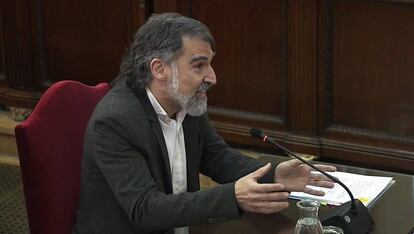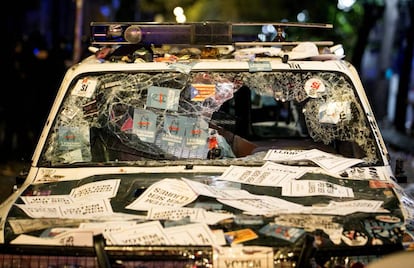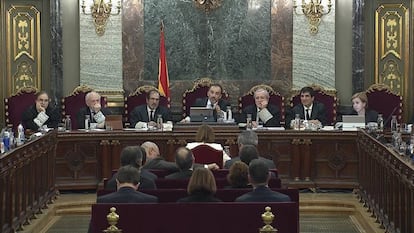Catalan separatist leader: “The referendum was the biggest exercise in civil disobedience in Europe”
The last two defendants at the Supreme Court trial in Madrid took the stand on Tuesday

The last two defendants in the trial of 12 Catalan separatist leaders took the stand on Tuesday inside the Supreme Court in Madrid.
In line with the others who testified before him, Jordi Cuixart, the head of a pro-independence civil organization called Òmnium Cultural, described himself as “a political prisoner, not a politician in prison.”
I am in prison for being a social activist
Jordi Cuixart
“I am in prison for being a social activist,” said Cuixart, who has been in pre-trial custody since October 2017, shortly after Catalonia held an unauthorized referendum that was followed by a unilateral independence declaration inside the Catalan parliament.
“What we did was the biggest exercise in civil disobedience in Europe,” he added.
Cuixart faces up to 17 years in prison for rebellion and sedition in connection with the alleged acts of violence that took place during the failed secession attempt. He is accused of playing a role in the September 20 protest outside the regional economic affairs building in Barcelona, where a crowd vandalized patrol cars and prevented police officers and court officials from exiting out the front door after conducting a search inside. An estimated 50,000 demonstrators answered the call made by pro-independence groups on social media.

Violence
Proving that violence existed is crucial to upholding the rebellion charge, and prosecutors have focused much of their questioning on this point. In April 2018, a German court refused to extradite Carles Puigdemont, the former Catalan premier who fled Spain to avoid arrest, on rebellion charges, saying it was not comparable with Germany’s crime of treason.
The high-profile proceedings at the Supreme Court have been cast as a political trial by the pro-independence movement, while Spain has launched an international campaign to defend the impartiality of the Spanish judiciary.
In recent years there’s been a politicization of the Constitutional Court
Carme Forcadell
The trial, which began two weeks ago, is further complicated by the snap general election called by Prime Minister Pedro Sánchez for April 28 after he failed to get his 2019 budget plan approved by Congress.
Carme Forcadell
In the afternoon, the panel of seven justices heard testimony from Carme Forcadell, the former speaker of the Catalan parliament, who faces rebellion charges like Cuixart. She is accused among other things of using her position to facilitate a vote on the “supporting legislation” that allowed the secession bid to go ahead.

Forcadell denied having “participated in” or “directed” a strategy for independence. “I merely performed my job as parliament speaker. My duties were confined to the legislative level,” she said.
Asked by the prosecution about Resolution I/XI, a piece of legislation that promoted a breakaway from Spain and acted as the starting point for the secession process, Forcadell told the court that “I voted for the resolution without reading it.”
Forcadell agreed with the prosecution that the Constitutional Court is the top authority on the Spanish Constitution, and not herself. But like the defendants who went before her, she questioned the tribunal’s legitimacy.
“In recent years there’s been a politicization of the Constitutional Court. I consider that it has used political criteria instead of legal criteria,” said Forcadell, adding that “it is not our will to disregard the orders of the Constitutional Court.”
Regarding the legislation passed in September 2017 to provide a legal framework for the referendum, the prosecution asked Forcadell if the regional parliament’s legal counsel warned them that this would be illegal. “Yes, but their decisions are not binding,” said Forcadell.
Starting on Wednesday, witnesses will begin to take the stand at Madrid’s Supreme Court. Up to 20 people will provide testimony this week, including former PM Mariano Rajoy and Basque premier Iñigo Urkullu. Their court appearances have been condensed into a short time period in a bid to prevent them from overlapping with the election campaign.
English version by Susana Urra.
Tu suscripción se está usando en otro dispositivo
¿Quieres añadir otro usuario a tu suscripción?
Si continúas leyendo en este dispositivo, no se podrá leer en el otro.
FlechaTu suscripción se está usando en otro dispositivo y solo puedes acceder a EL PAÍS desde un dispositivo a la vez.
Si quieres compartir tu cuenta, cambia tu suscripción a la modalidad Premium, así podrás añadir otro usuario. Cada uno accederá con su propia cuenta de email, lo que os permitirá personalizar vuestra experiencia en EL PAÍS.
¿Tienes una suscripción de empresa? Accede aquí para contratar más cuentas.
En el caso de no saber quién está usando tu cuenta, te recomendamos cambiar tu contraseña aquí.
Si decides continuar compartiendo tu cuenta, este mensaje se mostrará en tu dispositivo y en el de la otra persona que está usando tu cuenta de forma indefinida, afectando a tu experiencia de lectura. Puedes consultar aquí los términos y condiciones de la suscripción digital.








































